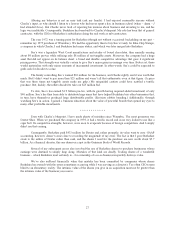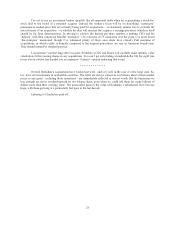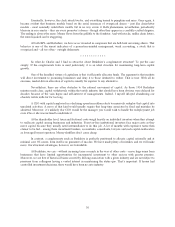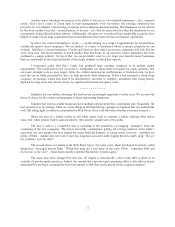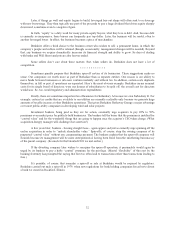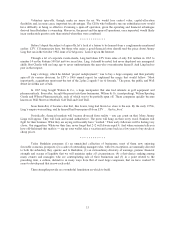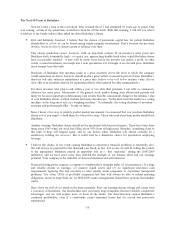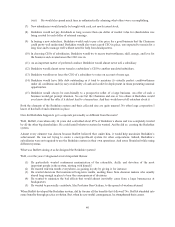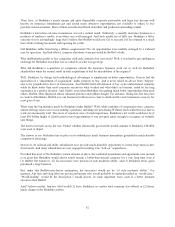Berkshire Hathaway 2014 Annual Report Download - page 36
Download and view the complete annual report
Please find page 36 of the 2014 Berkshire Hathaway annual report below. You can navigate through the pages in the report by either clicking on the pages listed below, or by using the keyword search tool below to find specific information within the annual report.The Next 50 Years at Berkshire
Now let’s take a look at the road ahead. Bear in mind that if I had attempted 50 years ago to gauge what
was coming, certain of my predictions would have been far off the mark. With that warning, I will tell you what I
would say to my family today if they asked me about Berkshire’s future.
‹First and definitely foremost, I believe that the chance of permanent capital loss for patient Berkshire
shareholders is as low as can be found among single-company investments. That’s because our per-share
intrinsic business value is almost certain to advance over time.
This cheery prediction comes, however, with an important caution: If an investor’s entry point into
Berkshire stock is unusually high – at a price, say, approaching double book value, which Berkshire shares
have occasionally reached – it may well be many years before the investor can realize a profit. In other
words, a sound investment can morph into a rash speculation if it is bought at an elevated price. Berkshire
is not exempt from this truth.
Purchases of Berkshire that investors make at a price modestly above the level at which the company
would repurchase its shares, however, should produce gains within a reasonable period of time. Berkshire’s
directors will only authorize repurchases at a price they believe to be well below intrinsic value. (In our
view, that is an essential criterion for repurchases that is often ignored by other managements.)
For those investors who plan to sell within a year or two after their purchase, I can offer no assurances,
whatever the entry price. Movements of the general stock market during such abbreviated periods will
likely be far more important in determining your results than the concomitant change in the intrinsic value
of your Berkshire shares. As Ben Graham said many decades ago: “In the short-term the market is a voting
machine; in the long-run it acts as a weighing machine.” Occasionally, the voting decisions of investors –
amateurs and professionals alike – border on lunacy.
Since I know of no way to reliably predict market movements, I recommend that you purchase Berkshire
shares only if you expect to hold them for at least five years. Those who seek short-term profits should look
elsewhere.
Another warning: Berkshire shares should not be purchased with borrowed money. There have been three
times since 1965 when our stock has fallen about 50% from its high point. Someday, something close to
this kind of drop will happen again, and no one knows when. Berkshire will almost certainly be a
satisfactory holding for investors. But it could well be a disastrous choice for speculators employing
leverage.
‹I believe the chance of any event causing Berkshire to experience financial problems is essentially zero.
We will always be prepared for the thousand-year flood; in fact, if it occurs we will be selling life jackets
to the unprepared. Berkshire played an important role as a “first responder” during the 2008-2009
meltdown, and we have since more than doubled the strength of our balance sheet and our earnings
potential. Your company is the Gibraltar of American business and will remain so.
Financial staying power requires a company to maintain three strengths under all circumstances: (1) a large
and reliable stream of earnings; (2) massive liquid assets and (3) no significant near-term cash
requirements. Ignoring that last necessity is what usually leads companies to experience unexpected
problems: Too often, CEOs of profitable companies feel they will always be able to refund maturing
obligations, however large these are. In 2008-2009, many managements learned how perilous that mindset
can be.
Here’s how we will always stand on the three essentials. First, our earnings stream is huge and comes from
a vast array of businesses. Our shareholders now own many large companies that have durable competitive
advantages, and we will acquire more of those in the future. Our diversification assures Berkshire’s
continued profitability, even if a catastrophe causes insurance losses that far exceed any previously
experienced.
34





